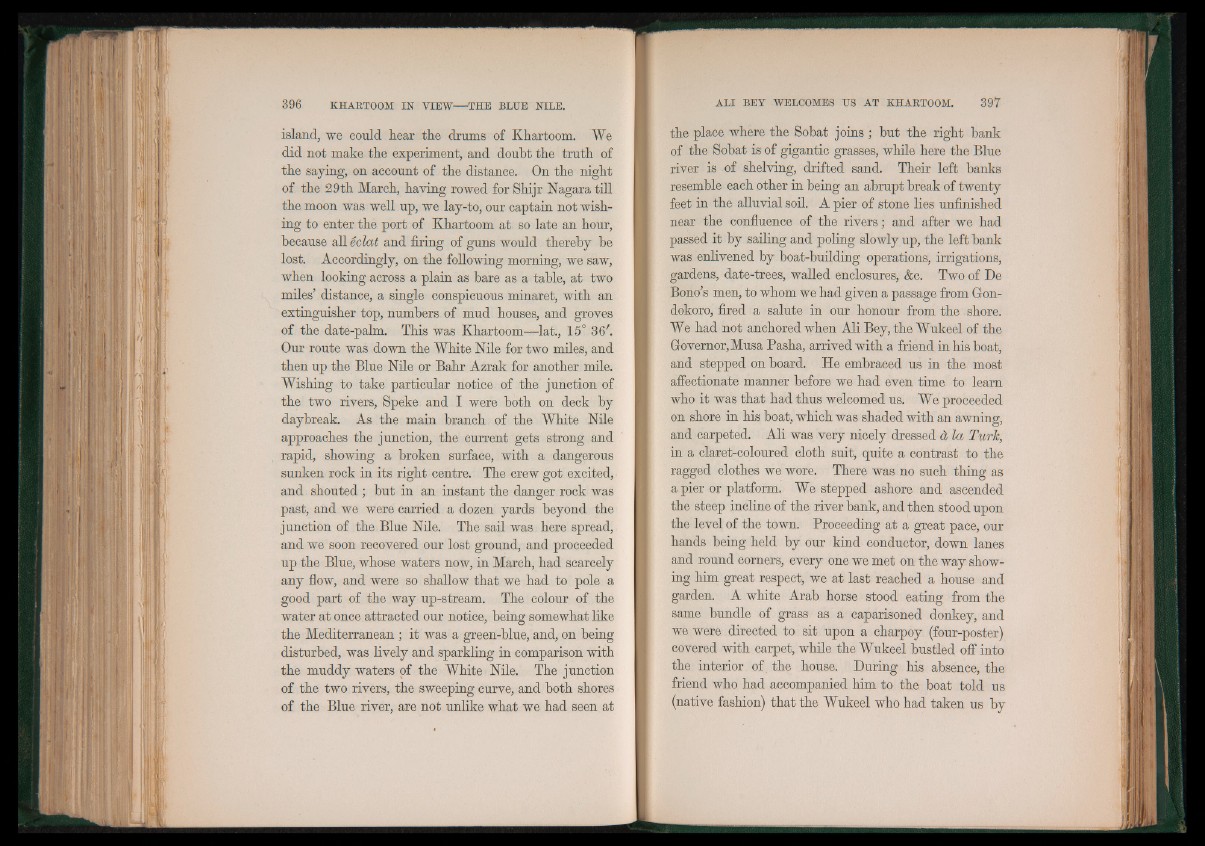
island, we could hear the drums of Khartoom. We
did not make the experiment, and doubt the truth of
the saying, on account of the distance. On the night
of the 29th March, having rowed for Shijr Nagara till
the moon was well up, we lay-to, our captain not wishing
to enter the port of Khartoom at so late an hour,
because all éclat and firing of guns would thereby be
lost. Accordingly, on the following morning, we saw,
when looking across a plain as bare as a table, at two
miles’ distance, a single conspicuous minaret, with an
extinguisher top, numbers of mud houses, and groves
of the date-palm. This was Khartoom—lat., 15° 36/.
Our route was down the White Nile for two miles, and
then up the Blue Nile or Bahr Azrak for another mile.
Wishing to take particular notice of the junction of
the two rivers, Speke and I were both on deck by
daybreak. As the main branch of the White Nile
approaches the junction, the current gets strong and
rapid, showing a broken surface, with a dangerous
sunken rock in its right centre. The crew got excited,
and shouted ; but in an instant the danger rock was
past, and we were carried a dozen yards beyond the
junction of the Blue Nile. The sail was here spread,
and we soon recovered our lost ground, and proceeded
up the Blue, whose waters now, in March, had scarcely
any flow, and were so shallow that we had to pole a
good part of the way up-stream. The colour of the
water at once attracted our notice, being somewhat like
the Mediterranean ; it was a green-blue, and, on being
disturbed, was lively and sparkling in comparison with
the muddy waters of the White Nile. The junction
of the two rivers, the sweeping curve, and both shores
of the Blue river, are not unlike what we had seen at
the place where the Sobat joins ; but the right bank
of the Sobat is of gigantic grasses, while here the Blue
river is of shelving, drifted sand. Their left banks
resemble each other in being an abrupt break of twenty
feet in the alluvial soil. A pier of stone lies unfinished
near the confluence of the rivers; and after we had
passed it by sailing and poling slowly up, the left bank
was enlivened by boat-building operations, irrigations,
gardens, date-trees, walled enclosures, &c. Two of De
Bono’s men, to whom we had given a passage from Gon-
dokoro, fired a salute in our honour from the shore.
We had not anchored when Ali Bey, the Wukeel of the
Governor, Musa Pasha, arrived with a friend in his boat,
and stepped on board. He embraced us in the most
affectionate manner before we had even time to learn
who it was that had thus welcomed us. We proceeded
on shore in his boat, which was shaded with an awning,
and carpeted. Ali was very nicely dressed d la Turk,
in a claret-coloured cloth suit, quite a contrast to the
ragged clothes we wore. There was no such thing as
a pier or platform. We stepped ashore and ascended
the steep incline of the river bank, and then stood upon
the level of the town. Proceeding at a great pace, our
hands being held by our kind conductor, down lanes
and round corners, every one we met on the way showing
him great respect, we at last reached a house and
garden. A white Arab horse stood eating from the
same bundle of grass as a caparisoned donkey, and
we were directed to sit upon a charpoy (four-poster)
covered with carpet, while the Wukeel bustled off into
the interior of. the house. During his absence, the
friend who had accompanied him to the boat told us
(native fashion) that the Wukeel who had taken us by